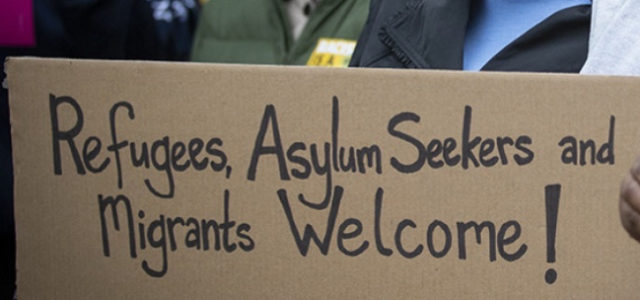Lucy Mayblin
The black lives matter protests around the world, sparked by the death of George Floyd in Minneapolis, are bringing out into the open how the legacies of colonialism and enslavement have shaped structural racisms in Britain today. From the Windrush scandal to Black and Asian health inequalities during the Covid-19 pandemic, the legacies of colonial hierarchies of human worth seem cemented into the fabric of our society.
Many of these legacies are harder to remove than statues. We should not be surprised, then, to discover that refugee history is also deeply connected to colonialism, and that people who apply for asylum in the UK today find themselves trapped in a dehumanising system designed to produce suffering.
It is not a stretch to say that life for people seeking asylum in the UK today is difficult. At the start of the pandemic people going through the asylum system received weekly support payments of £37.75. It took 12 weeks of campaigning to increase this by 26p per day. Support rates are determined on the basis of what the poorest ten per cent of British citizens spent on essential living items only in 2015. They are around a third of the weekly income of the poorest citizens, themselves having undergone a decade of austerity policies.
People who are receiving asylum support are rarely able to take busses to travel around the cities in which they live, to buy clothes, or even to eat sufficient food in many cases. In this sense, lockdown made little difference to many people’s lives in the asylum system. As a group they experience higher than average rates of infant and maternal mortality, domestic violence, mental and physical health problems, social isolation, and struggle to access basic services to which they are entitled.
The implications are so grave for children in asylum seeking households that numerous organisations have questioned whether support levels are in contravention of the UN Convention on the Rights of the Child. This is not an accident, poverty is a policy tool to discourage people who might apply for asylum from choosing the UK, and encourage those who are here to leave. This is the case even in spite of an absence of evidence that people “shop” for countries in which to apply for asylum on the basis of a comparative analysis of welfare support rates, or that those who are necessarily here are able to return to their countries of origin.
When refugee rights were founded at the UN in 1951 the colonial powers and the US made sure they only applied to Europeans. This is not a case of people in the past having different values. There were vocal protestations at the UN in the late 1940s by the representatives of India, Pakistan, Indonesia, Afghanistan and a host of other formerly colonised countries.These protestations were made in the language of anti-colonialism and pointed explicitly to the racist hierarchies of humanity being set up by the exclusionary asylum regime.
It was only through sustained resistance, fortified by decolonisation, that the right to asylum was won for non-Europeans in 1967. But winning a right does not erase the colonial logics which assume full human rights are primarily for white Westerners. Initially expansion made little difference and most refugees in Europe conveniently came from the Soviet Union.
But when black and brown people harking from formerly colonised countries started exercising their right to apply for asylum in European countries in the late 1990s, host governments started to view refugees as a problem. It was at this moment, when people seeking asylum became racialised as black and brown, that they came to be construed not as politically persecuted refugees but as economic migrants in disguise.
Politicians started talking about ‘bogus asylum seekers’ wanting to simultaneously steal jobs and illegitimately enjoy welfare support. These were economic migrants, they argued, they were from poor countries and did not have a legitimate claim to asylum. Real refugees would be grateful to be safe, they would not mind living in poverty.
There is actually no clear evidence that welfare or work act as “pull factors”, but nevertheless a series of legislative acts have been passed which have prevented people who are in asylum system from accessing the labour market, have moved them out of the mainstream benefits system, and have steadily decreased the levels of financial support paid to those going through the asylum system.
It is hard to examine the roster of policy changes introduced in Britain since the 1990s and not conclude that the asylum regime is dehumanising in ways which are clearly indebted to colonialism. Indeed, many migrant and asylum activists and advocacy organisations make that very accusation on a regular basis. If the effect is dehumanisation, the underlying rationale of the policies is that the humanity of asylum applicants is something to be respected to the bare minimum of legal obligation, and only where that legal obligation is enforced in the courts.
The government treats people who have applied for asylum as less than human in ways that are clearly informed by a long tradition of unequal rights. If we are serious about challenging the colonial logics which continue to underpin government policy today, the asylum system has to be part of that conversation.
Lucy Mayblin is Senior Lecturer in Sociology at the University of Sheffield and author of ‘Asylum After Empire: Colonial Legacies in the Politics of Asylum Seeking’ (2017) and ‘Impoverishment and Asylum: Social Policy as Slow Violence’ (2019).
